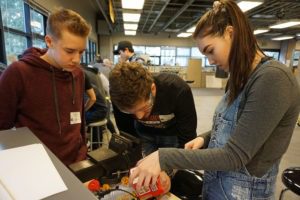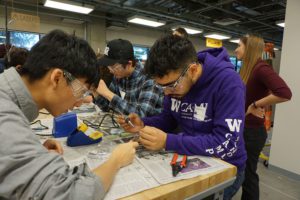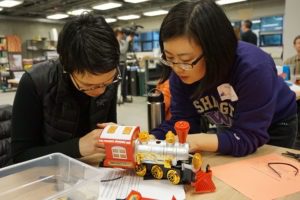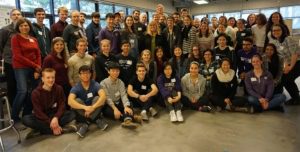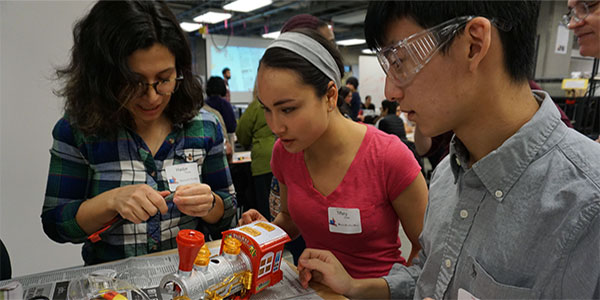At the TCAT Hack for Access: Holiday Toy Event on Sunday December 11, volunteers from UW and the Seattle community adapted toys for children with disabilities – just in time for the holidays! Approximately 50 volunteers from UW and the community – including children with disabilities and their families and self-identified “hackers” (people who enjoy tinkering or building things as a hobby or profession) – adapted 30 toys at the event. The event was featured on Seattle’s KING 5 News.
The event was led by the Taskar Center for Accessible Technology (TCAT) in the Department of Computer Science & Engineering, Bioengineering Outreach and the Ability & Innovation Lab in Mechanical Engineering.
The Holiday Toy Hack was supported by an AccessEngineering minigrant to Dr. Dianne Hendricks and Molly Mollica of Bioengineering; Dr. Anat Caspi, director of TCAT; and Dr. Heather Feldner of Mechanical Engineering. Collaboration among these departments will continue with the launch of HuskyADAPT (Accessible Design and Play Technologies), an initiative that will provide College of Engineering students the opportunity to create accessible and affordable assistive technology.
Toy adaptation involves modifying a toy to enhance the user’s experience. At the Holiday Toy Hack, volunteers added a universal switch to each toy so that a child can activate and play with the toy using his or her unique abilities. For example, instead of pushing a small button to activate a toy, a child can activate the toy by tilting their head, pulling on a string or pushing a large button.
Adapting toys is important because play is crucial for cognitive and social development, as it teaches children simple concepts such as cause and effect and provides an opportunity for children to interact with their peers and the environment. Toy adaptation is an example of universal design in engineering, which is the design of products and environments for all people.
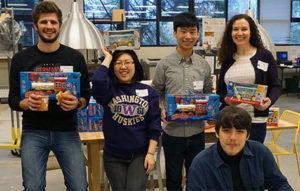
Seniors Moritz Lange, Roujia Wang, Philip Lee and Alexander Novokhodko, and Lecturer Dianne Hendricks
Bioengineering seniors Moritz Lange, Philip Lee, Alexander Novokhodko and Roujia Wang played a significant role in the event by training lead volunteers prior to the event, and assisting community volunteers with soldering and troubleshooting during the event. The honors students are completing a year-long service project required for graduation with Bioengineering Departmental Honors and have named their team Huskies ADAPT (formerly Washington Has Adapted Toys).
Alexander Novokhodko has a new-found appreciation for universal design. “As an engineer, it is very important to me that anything I create is accessible for everyone. This project was my first exposure to universal design and it has been a wonderful experience.”
Roujia Wang now has a better understanding of how universal design can make a real-world positive impact. “Before starting this project, I had heard the term universal design without really understanding the meaning behind it. I am really excited to see how my engineering skills can be used to make a difference in other people’s lives.”
“Every child should have the opportunity to play with toys and share experiences with their friends. It has been so rewarding to adapt these toys to help children connect and play together.”
– Philip Lee, BioE senior, honors student
During the event, two children with disabilities tested the newly adapted toys. Philip Lee underscores the importance of toy adaptation. “Being a part of this team has been an incredible learning experience in understanding universal design and realizing its importance. Every child should have the opportunity to play with toys and share experiences with their friends. It has been so rewarding to adapt these toys to help children connect and play together.”
The honors team is mentored by first-year Bioengineering Ph.D. student Molly Mollica, who helped launch the Toy Adaptation Program at Ohio State University.
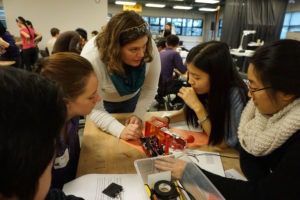
Ph.D. student Molly Mollica demonstrating toy adaptation
“I worked on toy adaptation in Ohio for three years and am excited about being able to do so in Seattle as well. I’m passionate about toy adaptation because of its community impact and its impact on students. While adapted toys teach children important concepts such as cause and effect, the process of adapting toys teaches participants circuitry, soldering, universal design and reverse engineering. Perhaps most importantly, it demonstrates the community impact that is possible using introductory engineering skills.”
The students are also mentored by Dr. Dianne Hendricks , who notes that that leading both the departmental honors program and Bioengineering Outreach is a career and personal highlight. “I really enjoy teaching the honors seminar and mentoring all the honors students as they complete their team service projects. I am so fortunate to have this opportunity to combine my favorite things: teaching, service and mentoring.”
Dr. Hendricks credits Molly with bringing this high-impact project to UW BIOE. “The altruistic and educational components of toy adaptation are tremendous – I am so grateful to Molly for bringing toy adaptation to our department! We are very fortunate to have the opportunity to learn from Molly’s expertise and benefit from her leadership. Toy adaptation is an excellent opportunity to teach students the importance of universal design and to help them develop real-world engineering skills such as soldering. Importantly, the students also cultivate their communication, mentoring, teamwork and problem solving skills.”
Recently, Huskies ADAPT trained physical therapists in toy adaptation and helped establish a lending library of adapted toys at Valley Medical Center in Renton, WA. Alexander Novokhodko notes that this project is a real opportunity to make a lasting difference and fill a real, unmet need. “There are adapted toy libraries elsewhere in the country, but here in Washington State we had none. By the time this project ends, I hope that this will change, and the opportunity to be a part of that — a part of creating something positive, permanent and tangible, is an uplifting experience.”
The Huskies ADAPT honors team will continue to train others, help lead events, and demonstrate toy adaptation to local middle and high school students in collaboration with Bioengineering Outreach, the departmental K-12 educational outreach initiative to increase diversity and inclusiveness in STEM fields.
At a recent Bioengineering Outreach event, Molly Mollica demonstrated toy adaptation to high school students from the Academy of Precision Learning. Dr. Hendricks notes that “helping” or altruistic bioengineering applications such as toy adaptation are very appealing to high school students who want to make a positive impact, but do not already identify as future scientists or engineers.
Bioengineering honors student Moritz Lange is looking forward to bringing toy adaptation to engineers and the community. “As an engineering student with classes focused specifically on design, it was surprising to me that I hadn’t come across universal design previously in my education. After my experience in facilitating the Toy Hack, it has become incredibly clear to me how valuable teaching universal design can be; not only for engineers, but also parents and community members. I am very excited for the upcoming year!”
Bioengineering honors student Alexander Novokhodko concludes, “I hope that the adapted toys bring children cheer for the holidays, and I hope volunteers leave the workshop with a new perspective on engineering design, and confident that they have the skills to continue this work. I know I did!”
